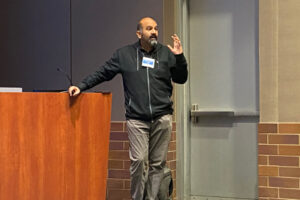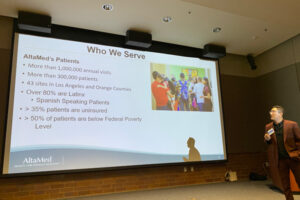NeuroScholars support one another in shift to remote learning
By Diana Lofflin
For many students, navigating the uncharted upper-division undergraduate research and mentorship opportunities at UCI can feel like a daunting task. This year, this task was intensified by the shift to virtual learning and the social distancing required to curb the spread of COVID-19.
Despite these challenges, a group of dedicated undergraduates, the NeuroScholars, found ways to support one another and build community around their shared passion for understanding the brain.
“I got really excited about NeuroScholars because it was the first program that was mainly focused on people interested in the brain,” said Caterina Santelli, a senior majoring in Biological Sciences. “I love the fact that you can engage with faculty members.”

Dr. Sunil Gandhi, NeuroScholars program director, speaks in an information session.
Santelli joined last year as part of the first cohort of NeuroScholars. The program, housed in the Center for the Neurobiology of Learning and Memory (CNLM), supports upper division undergraduate students from across campus in securing research, lab, and mentoring experiences to prepare them for the next step in their career.
Professors Sunil Gandhi and Pavan Kadandale co-direct the program which now includes 40 UCI students. “Gaining research experience as an undergraduate seems straightforward, but there are significant roadblocks along the way,” explains Gandhi. “A student’s email may go unanswered or they may not possess the right lab experience. These hurdles are even more challenging for transfer students.”
The NeuroScholars program supports students by providing a lab training and a tight-knit community of brain enthusiasts. When the global COVID-19 pandemic shut down in-person classes, events and gatherings at UCI, the entire structure of the program had to change.
“The program has really pivoted as it relied on the lab course and hands-on experiences which are not currently possible,” explained Manuella Yassa, Director of Outreach and Education at the CNLM. “We continued with a virtual recruitment this spring and welcomed a second cohort because at unprecedented times like these, communities are even more valuable. It has been incredible to watch the incoming NeuroScholars build this community in the virtual environment.”
Yeab Guracha, a third-year transfer student, was one of the newly recruited NeuroScholars who will start his first year at UCI virtually. “When I joined this program earlier this summer it was apparent from the beginning that a fulfilling experience would require all of us taking charge and making the best of the current situation,” said Guracha.

Dr. Roger Liu, an external advisor to the NeuroScholars program, gives a presentation during an information session.
What organically transpired was the NeuroScholars taking on leadership roles, helping one another, and building a community — the exact experience the directors envisioned for this program. “The most inspiring transformation has been the building of community and the leadership that the NeuroScholars have demonstrated in taking charge of their own experience,” said co-director Kadandale.
The 40 NeuroScholars formed committees around specific interests to create virtual events to engage and support one another. The research committee hosts weekly ‘Science Talks’ to sharpen their skills of reading and making sense of complex scientific research. Another group formed around their shared interest in learning the coding program R.
“As a transfer student, one of the best ways this program has helped support me is by providing access to other transfer students who have succeeded as specialized BioSci students at UCI,” explained Guracha. “Earlier this summer, one of our committees held a seminar about how to approach joining a research lab as an undergraduate during COVID-19. Thanks to the seminar and the advice of those who shared their personal experiences with me, I was able to join a Bio199 lab myself this year.”
The NeuroScholars program is set to continue throughout the academic year and will resume the lab component as soon as they are able. To find out more about the program and to explore ways to support these young scholars, visit cnlm.uci.edu/neuroscholars.

Diana Lofflin
Diana is the Director of Strategic Communications at the Center for the Neurobiology of Learning and Memory. She specializes in leveraging technology and design to make complex concepts accessible to a general audience. Her diverse skillset -- including strategic planning, graphic design, website development, and social media strategy -- has been instrumental in bringing the important work happening at the CNLM to a larger audience.
The NeuroScholars Program was designed to enrich the upper-division undergraduate research experience at UCI. The program is open to undergraduate and transfer students from all majors, schools, and disciplines.
